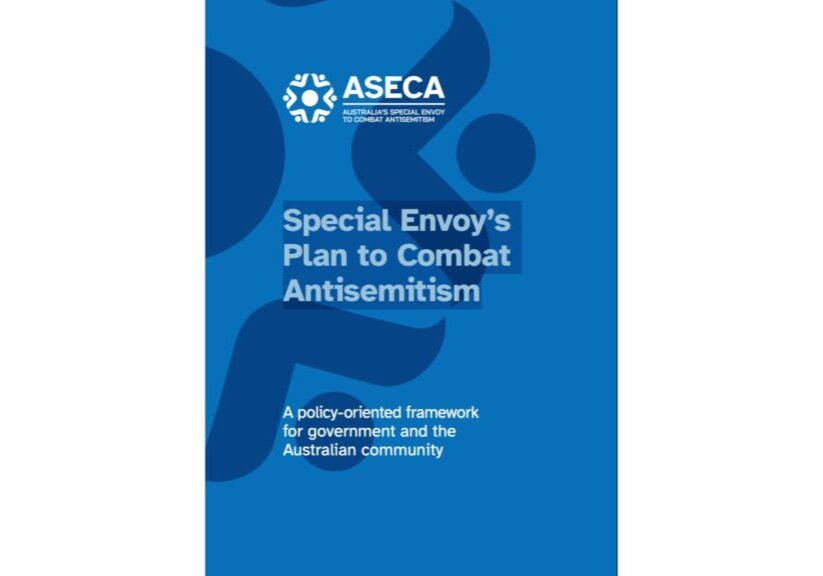Australia/Israel Review
The Last Word: Stage Frights
Oct 31, 2014 | Jeremy Jones

Jeremy Jones
The operation of Australia’s anti-racism legislation is a serious issue, but there were quite a few bizarre moments during the course of a number of complaints in which I was involved.
Outside the Hobart Court in which one hearing was taking place, a motley chorus sang and chanted comments calling me an antisemite, on the grounds that the Jews of today are apparently impostors and pure Aryan Europeans are the direct descendants of the People of the Bible.
That group began the day physically inside the courtroom, where they prayed for divine intervention to have me embrace their Identity Church beliefs – and presumably accept I was the Spawn of Satan – but took their performance outside when the judge arrived.
Inside the courtroom, unusual events included my being cross-examined on Jewish practice based on twisted and false misrepresentations of the Talmud.
It was, in a sense, theatre – theatre of the absurd.
Although Section 18C of the Racial Discrimination Act, defining what is unlawful to express, received much public discussion in the past year, Section 18D, the wide-ranging exemptions, did not.
The first part of 18D reads, “Section 18C does not render unlawful anything said or done . . . in the performance, exhibition or distribution of an artistic work . . .”
When a respondent to a claim was asked whether they wished to argue their anti-Jewish activity was exempt, they asked, more out of curiosity than anything else, whether what they had done could perhaps be considered art, before accepting that they had not been engaging in a cultural endeavour or been providing, at least intentionally, entertainment.
The blanket defence offered creative works was, however, successfully used when a playwright openly admitted his work was designed to incite ill-will and anger against an identifiable ethno-national group.
It isn’t that plays, songs, literature or paintings cannot or do not function in a manner parallel to, or at times worse than, other racist advocacy, but that, in finding a balance between freedom of expression and freedom not to have your security and/or quality of life diminished by the act of another, artistic work was placed on one side of the ledger.
Writing in the Jerusalem Post, Efraim Zuroff recently noted that, in one week in October 2014, dramatic presentations in Latvia and the USA delivered “a powerful message with serious negative implications for the Jewish people”.
In New York, the Metropolitan Opera began showcasing the opera, “The Death of Klinghoffer”, which has rarely been praised on the basis of artistic merit but gained notoriety for promoting a moral equivalence between murderers (in this case, terrorists from the Palestine Liberation Front) and their victim (in this case, wheelchair-bound American Leon Klinghoffer).
Charles Ascher Small and other scholars have outlined some of the intellectual and moral failings of the opera, which begin with the title – why wasn’t it accurately dubbed “The Murder”, rather than “The Death”?
Reviews of the New York performance ran the gamut from wonderfully staged, well-performed and nuanced, to boring, offensive, sleep-inducing dross. The strongest criticism, however, came from two private citizens, the daughters of Leon Klinghoffer, who had seen their personal grief disingenuously and dishonestly misappropriated to serve an agenda of garnishing a degree of sympathy for terrorists.
The Latvian musical “Cukurs” is a glorification of the life of Herberts Cukurs, a national hero aviator of the 1930s who in 1941 volunteered to help with the Nazi’s “Final Solution”.
The second-in-command of the notorious Arajs Kommando, which had no purpose other than murdering tens of thousands of Jews in Belarus and Latvia, he escaped to Brazil after witnesses confirmed his identity.
The musical whitewashes his crimes, and in so doing is part of a process in the post-Soviet Baltics to rehabilitate Cukurs and other Nazi criminals.
In both cases, freedom of expression has been exercised, but so has freedom from morality.
Those responsible for the productions deserve to be challenged on that basis, just as others who promote distortions, amorality and incitement are regularly called to account.
Tags: Antisemitism






